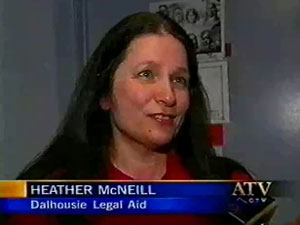 |
| VIEW VIDEO: Aboriginal law students inspire youth, from ATV Evening News. QuickTime, broadband connection required. |
As late as 1951 Aboriginals were not permitted to buy a beer in Canada, and as recently as 1960 they were not allowed to vote. Most of us go day to day without ever thinking back to Canada's history, and more importantly who were the first settlers here in what we now call Canada.
║┌┴¤│ď╣¤═°Aboriginal Law Student Association (DALSA) is one student body that has dedicated their time, effort and developing expertise as future lawyers into organizing events and activities that will bring the Aboriginal perspective into the ║┌┴¤│ď╣¤═°law school and to surrounding communities.
"Ujit Elmi'knik: For the Future" was the name of the conference held last weekend, in order to evaluate various ways by which First Nations, particularly the Mi'kmaq, seek to progress their interests. The conference focused on the three main avenues by which first nations are increasingly using in order to further their interests in their communities. The first is Aboriginal and Treaty rights litigation; the second is the negotiation process with the Canadian government; and the third is self-sufficiency through private enterprise and economic development.├Ő
The two-day conference invited speakers from across Canada, consisting of law professors, practicing lawyers, and community leaders, all of them were recognized experts in their fields.├Ő
"We wanted to provide a forum for leaders and representatives of Mi'kmaq communities, lawyers, academics, and students who are (or are considering) pursuing these avenues to come together to talk about what's working; what's not; and what are the challenges and barriers that exist with each of these avenues, in order to evaluate them and hopefully even strategize for the future," says Naiomi Metallic, DALSA's President. "That's why we called this Conference Ujit Elmi'knik - which means "for the future' in Mi'kmaq."
In a forward looking step, DALSA also organized a full day event at the Mi'kmaq Native Friendship Center for nearly 40 Mi'kmaq youth from various parts of the Maritimes. There were students from Eskasoni, Pictou Landing, Waycobah, Indian Brook, Chapel Island, Listuguj, and off-reserve students who attended.
The event was put together with the intention of encouraging youth to get involved in aboriginal issues and to stress the importance of furthering their education. The hope is that the young audience will aspire to become future leaders of their communities.
"Since this is an event focused on the future, we wanted to reach out to our young people, who will be our future. We wanted to encourage them to get involved in Aboriginal issues and to continue with their education by attending university," says Metallic.
Some members of the ║┌┴¤│ď╣¤═°Aboriginal Law Student Association who volunteered their time at the conference were: Josie McKinney, a second year law student, of both Mi'kmaq and Maliceet origin; Shelly Martin, also a second year law student, and Mi'kmaq with roots in the Millbrook community; and Joanie Stevens, a second year law student, and Mi'kmaq from Pictou Landing. All the student organizers brought their passion for Aboriginal issues to the volunteer effort.
